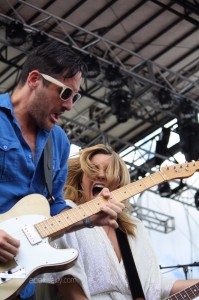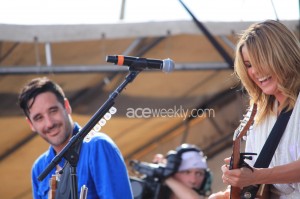
It was memorable for other reasons as well. “I’m not pulling the veil back on Grace at all, but two years ago, we all got violently ill. I was the one who first got it at Red Rocks in Colorado, I don’t know how. It felt like it was food poisoning or one of those 24-hours; you’ve never been through anything like this. Kind of like between giving birth and the exorcist was basically the experience of this.” He laughs, “Everyone got it on the whole bus because we were running the crew and the band on the same bus. I was the first one then I think Grace got it second and then we came here and we played in the afternoon and it was so hot. It was so hot. And she went out there and just did it and put on a great show still. We all somehow made it through the gig. We were all sweating buckets. Even if you were 100 percent healthy, you would have been so tired after the show. She came back and just passed out in the bus, just pshhhhh, for real passed out, not just like, ‘oh she passed out.'” That’s not an expression. “we had to call somebody. So we had to get the paramedic, put an IV in her – the real stuff. So that’s not like a fun, crazy, story but it’s kind of cool to shine a light on how badass she is. A lot of people would have definitely canceled the show. She’s a pretty a tough person.”
Shows like Forecastle are an opportunity to break out. He says, “Festivals are fun because a lot of time you have a larger crowd than you would normally have. That’s a big part of it especially when you’re up and coming. Like when we played at Bonnaroo, that was such a big deal for us. We would play to 5,000 people, which when we’d go out on the road for normal shows, we’d play anywhere from 150 to 1000 or whatever. So that’s really cool. There’s the excitement. I think generally there’s also a younger audience and sometimes more energetic. I think it’s also cool to go catch other acts at a festival.” Bands also get to be fans at the festivals. He says, “Today, I was really bummed I missed Bambino, but it can go from anything to old stuff from Robert Plant so that’s exciting. Something you haven’t heard before (and) something you’ve grown up with. Variety, the spice of life.” They’d “just played three shows with Robert Plant,” but he still admits to being “star struck” by the experience, though he says, “we’ve been doing it for ten years so you condition yourself to not be as…” Fanboy?

Of his roots he says, “Vermont’s kind of like-I don’t want to say anti-celebrity, but Vermont is like you never want to get too big for your britches. There’s a good thing with Vermont about that. And everybody’s looking at their neighbor a little bit like, ‘really, are you going to drive that car?'”
“That being said,” he qualifies, “I was super pumped to see Robert Plant. I heard his voice and it sounds just like it does on the records and yeah, he was a really cool person so that’s awesome.”
Asked about his solo album, he says, “Ahh, I have a hard time talking about myself. I’m bad at self-promotion. It was a journey. It felt like I birthed an album. I was really hyper-aware of making something that wasn’t just personal. You know it’s not just mine. You make music because you want to share it.”
He says, “I take a long time to filter and edit and just really make sure that this is what I want to put out to the world. Because in this day and age, you can make a record anywhere, anytime. I could make 20 records a year, like Ryan Adams used to do, but then people don’t listen to what you say as much. It’s the boy who cried wolf a little bit. It had been seven years since I had put out a solo album, so yeah it had taken some time. I made sure it meant something.”
The process was similar to how he works with the Nocturnals. He said, “I did everything with my solo album. It’s like cooking in the kitchen with a bunch of people and with the Nocturnals, I’m the prep cook or whatever they call it. I have one role and with my album, it was more like I was cooking at home. I had all my own spices. So they’re different. I’m proud to be a part of both of them. With the Nocturnals, I’m a part of something larger than myself and I know that and I’ve always been aware of that. I mean Grace is like the best singer that you could get so I give myself to the Nocturnals to some degree as we all do-even her to some degree. It’s like being a part of a team or a family, or a relationship. It’s like being in a relationship with four other people. There’s a lot of similarities. We live together. We exist together.”

It pays off in the joy that comes through in their live shows. “There’s certain kind of bands-maybe like Radiohead,” he says, “they can look pissed off on stage and you would never know this difference, and for us, our music is joyous. And we’re not really good fakers. We aren’t phony. WE can fake it to a degree. But our whole thing is being happy and joyous on stage-which is kind of what a lot of people are attracted to. You can notice. In our career, we’ve had some shows where we were struggling a little bit and we felt it and it sucks.
“I’m a little different when I play with the Nocturnals because I don’t have to be as aware and as in tune with the crowd. Because Grace does that and she’s amazing at that. But for me, I can like zone out and be a musician and a lead guitar player and be a little more focused on that side of things.
“That’s what comes easy for me-being a musician and a guitar player. Singing and writing songs comes easy enough, coming, getting in front of people, ‘hey how’s everyone doing tonight’ I don’t really like doing that that much. I do that for my own music when I go out for a tour because I love the music and it means that much to me and I really enjoy it. Playing it. I brace through the rest of it. It’s hard. It’s not easy for me to do that. So with the Nocturnals it’s easy and plays on my strengths. That’s probably why I ended up in this career and in this band and doing this job. It comes naturally and I think people gravitate towards things that come naturally to their careers.”
The band keeps peeling back layers each time a new album comes out. With two albums ago, Grace Potter & the Nocturnals, the band had an image, Grace had an image. Now it seems like that’s shifted a bit. Was that planned?
“It just happened,” he says. “I think it was the producer that brought that out of us to a degree. And we were totally psyched to do that as well. I think we had been toying around with that for a while. Coming from Vermont like we talked about with the image. We’ve gone through some growing pains changing and being the gross term, ‘rock stars.’ I don’t see us that way, but that’s what we do when we’re on stage at least. While we’re onstage, yeah that’s what we are.”

He didn’t catch Coyne’s Forecastle show. “I’m sure it was amazing though,” he says, “I love that stuff.”
There is a trend toward electronic. Jim James’s solo album is different from his work with My Morning Jacket.
“Yeah, that kind of happened in the 80s if you look at the trajectory of music. It comes and goes and rock and roll has been really slowing down a lot. It’s about hip-hop, country and pop right now. You just gotta let it ride, because it comes back around. We talk a lot about this stuff as a band in our side conversations. Things come and go. Right now we’re in the computer era. Everyone is exploring computers and dance music and that’s where we are and there’s cool things that come with that. And at some point I think people will be like, ‘hey, you know what? I want to hear human beings playing music together.’ Because when human beings play music together, that’s something that a computer can’t replicate because we make mistakes and we’re like raw. There’s just that thing. We’re living and breathing and there’s something that happens when human beings play and sing together that you’re not going to get from a DJ. Both are valid, but we aren’t losing rock and roll.”
So did the near-death experiences at Forecastle two years ago make them nervous about this year’s show? “No,” he says, “We’re going to kill it.”
And they did.

























